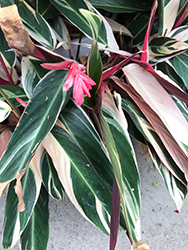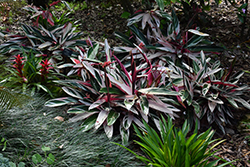Height: 3 feet
Spread: 3 feet
Sunlight:
![]()
![]()
Hardiness Zone: (annual)
Other Names: Tristar Stromanthe
Description:
A stunning herbaceous tropical perennial from the Prayer Plant Family; lustrous tricolor leaves of green, variegated with cream, with red reverses follow the sun during the day and fold at night; a great accent for annual beds or containers
Ornamental Features
Tricolor Stromanthe's attractive large narrow leaves remain green in colour with showy creamy white variegation and tinges of dark red throughout the year on a plant with an upright spreading habit of growth.
Landscape Attributes
Tricolor Stromanthe is a dense spreading evergreen tropical plant with an upright spreading habit of growth. Its relatively coarse texture can be used to stand it apart from other garden plants with finer foliage.
This plant will require occasional maintenance and upkeep, and should not require much pruning, except when necessary, such as to remove dieback. It has no significant negative characteristics.
Tricolor Stromanthe is recommended for the following landscape applications;
- Mass Planting
- General Garden Use
- Container Planting
Planting & Growing
This plant is native to the tropics and prefers growing in moist environments with evenly warm conditions all year round. In our climate, it is usually grown as an outdoor annual in the garden or in a container. If you want it to survive the winter, it can be brought in to the house and provided with special care, and then returned to the garden the following season. In its preferred tropical habitat, it can grow to be around 3 feet tall at maturity, with a spread of 3 feet. However, when grown as an annual or when overwintered indoors, it can be expected to perform differently, and its exact height and spread will depend on many factors; you may wish to consult with our experts as to how it might perform in your specific application and growing conditions.
This plant does best in full sun to partial shade. It prefers to grow in average to moist conditions, and shouldn't be allowed to dry out. It is not particular as to soil pH, but grows best in rich soils. It is somewhat tolerant of urban pollution. This is a selected variety of a species not originally from North America. It can be propagated by division; however, as a cultivated variety, be aware that it may be subject to certain restrictions or prohibitions on propagation.
Tricolor Stromanthe is a fine choice for the garden, but it is also a good selection for planting in outdoor pots and containers. With its upright habit of growth, it is best suited for use as a 'thriller' in the 'spiller-thriller-filler' container combination; plant it near the center of the pot, surrounded by smaller plants and those that spill over the edges. It is even sizeable enough that it can be grown alone in a suitable container. Note that when growing plants in outdoor containers and baskets, they may require more frequent waterings than they would in the yard or garden.
-- THIS IS A TROPICAL PLANT AND SHOULD NOT BE EXPECTED TO SURVIVE THE WINTER OUTDOORS IN OUR CLIMATE --
Disclaimer - This resource is provided for informational purposes only and does NOT reflect current availability. Inventory varies seasonally, so we cannot guarantee that every plant will be in stock at all times - please contact your favourite GardenWorks location directly for current availability. It does not include our entire inventory of plants, so be sure to visit GardenWorks to see varieties that may not be represented on this list.


